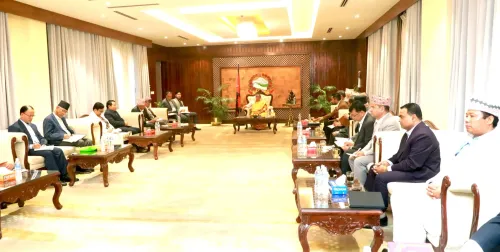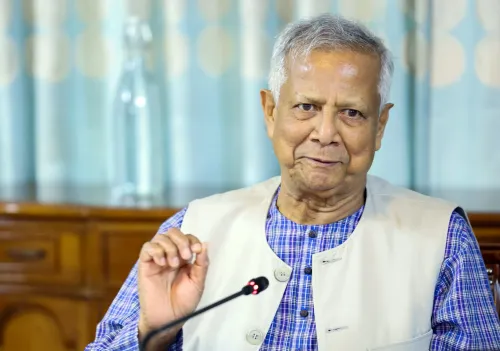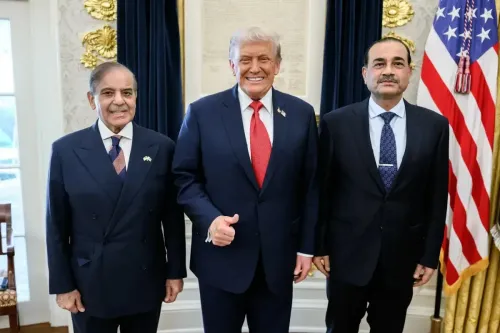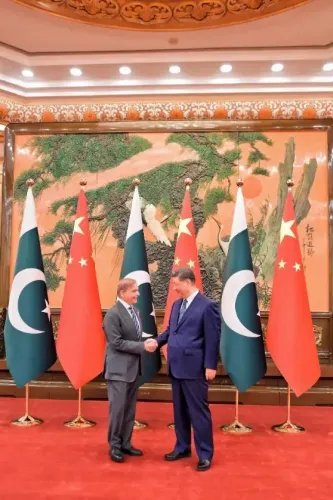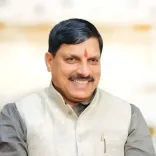Are Both Countries Just Warming Up? PM Modi's Historic Address at the Namibian Parliament
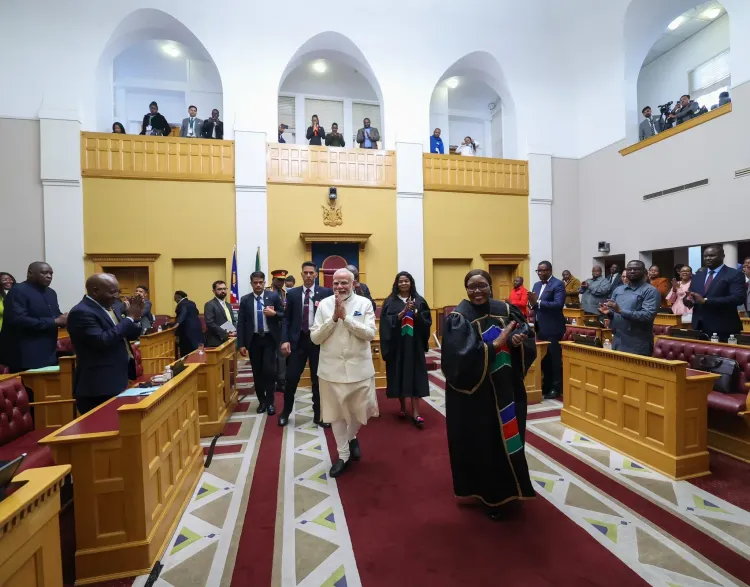
Synopsis
Key Takeaways
- PM Modi's visit marks a significant milestone in India-Namibia relations.
- Cricket metaphors illustrate the potential for faster bilateral growth.
- India is committed to supporting Namibia's youth through entrepreneurship initiatives.
- Healthcare cooperation includes advanced cancer treatment technology.
- Both countries share a deep commitment to democratic values and freedom.
Windhoek, July 9 (NationPress) Utilizing a cricket metaphor to highlight the immense potential for advancement in India-Namibia relations, Prime Minister Narendra Modi stated on Wednesday that both nations are merely "warming up" and will "score faster, score more" in the years ahead.
During his one-day State Visit to the African nation, PM Modi addressed the Joint Session of the Parliament of Namibia, emphasizing that both countries belong to the Global South, sharing similar aspirations and dreams.
He remarked, "Our bilateral trade has surpassed $800 million, but like on the cricket field, we are just warming up! We will score faster and score more! We are privileged to support Namibia's youth through the Entrepreneurship Development Centre, a hub for mentorship, funding, and friendship for aspiring entrepreneurs."
Starting his speech, PM Modi expressed that he stands before the Namibian lawmakers as "a representative of the Mother of Democracy", extending warm greetings from 1.4 billion Indians.
He underscored the strong democratic values shared between India and Namibia, recalling Dr. Sam Nujoma's legacy, the nation's founding father, and highlighting that the heart of this significant relationship lies in the people of both nations.
Looking towards the future of the India-Namibia partnership, PM Modi asserted that India will walk alongside Namibia and stand in solidarity with the Global South. Both nations have a shared history of fighting colonial rule.
"We cherish our historical ties while focusing on realizing the potential of our shared future. We recognize immense value in collaborating on Namibia's Vision 2030. Our partnership is centered around our people, with over 1,700 Namibians benefiting from scholarship and capacity-building initiatives in India," he emphasized.
He stated that both countries prioritize dignity and freedom, guided by their constitutions to uphold equality, liberty, and justice.
"It’s the strength of India’s Constitution that allows a daughter from a poor tribal family to become the President of India. This very Constitution enabled me to serve as Prime Minister three times. When you have nothing, the Constitution provides everything!" he noted.
In his address, PM Modi stated that India is not only advancing its own development but also guiding the aspirations of the world, particularly the Global South.
"This is India’s message: success can be achieved by following your own path, with dignity and culture intact," PM Modi declared.
He highlighted Namibia as the first nation to adopt India’s UPI, and soon, the people of Namibia will be able to send money faster than one can say "Tangi unene", or thank you very much.
"India is ready to provide Namibia with a Bhabhatron radiotherapy machine for advanced cancer treatment. This machine, developed in India, has been deployed in 15 countries, aiding half a million patients with critical cancer care."
PM Modi continued, "Our development partnership in Africa amounts to over $12 billion. However, its true value lies in shared growth and purpose. We continue to build local skills, create jobs, and support innovations. We also invite Namibia to participate in the Jan Aushadhi program for affordable quality medicines, which has reduced medicine costs in India by 50-80%. This initiative benefits over one million Indians daily, saving patients nearly USD 4.5 billion in healthcare expenses."
As he commenced his address, PM Modi was greeted with a standing ovation from lawmakers, with chants of 'Modi, Modi' resonating throughout the chamber.
This marks PM Modi’s third address to a parliament within a week.
On July 3, he addressed a special session of the Parliament of Ghana, becoming the first Indian Prime Minister to do so.
Subsequently, on July 4, at the invitation of the Senate President and House Speaker, PM Modi addressed the Joint Assembly of the Parliament of Trinidad & Tobago, marking a significant milestone in India-Trinidad & Tobago relations.
Previously, after discussions to further strengthen bilateral ties, Prime Minister Modi and Namibia's President Netumbo Nandi-Ndaitwah witnessed the exchange of two Memoranda of Understanding (MoUs) in health and entrepreneurship in Windhoek.
The MoUs include the establishment of an Entrepreneurship Development Centre in Namibia, along with cooperation in health and medicine, all part of PM Modi’s one-day visit, the first by an Indian Prime Minister in 27 years.
Furthermore, it was announced that Namibia has joined the Coalition for Disaster Resilient Infrastructure (CDRI) and the Global Biofuels Alliance.
The African nation is also the first to enter a licensing agreement to adopt UPI technology, with the launch of a Digital Payments system in Namibia expected later this year, following the signing of the UPI technology licensing agreement between NPCI and the Bank of Namibia in April 2024.

